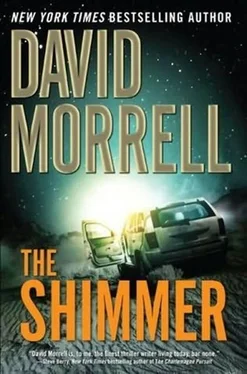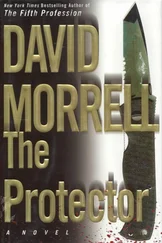Brent waited for her to drive through the opening. Then he moved the fence back so the hinges seemed intact. He got into the passenger seat, and she drove down the lane. Dust rose behind them.
“If there’s a guard, the dust’ll warn him we’re coming a long time before we get there,” Anita observed.
“No problem-I just want to get a shot of the place. Maybe I’ll see something that’ll help me connect it to the lights, but now that we’re out here, I can’t imagine what it would be. I hate to admit it, but this story might have played itself out.” He thought for a moment. “Un- less there’s another shooting tonight. We can always hope for that.”
He glanced at her left hand on the steering wheel. “You’re not wearing a wedding ring, so I’m guessing you’re not married. Do you have a boyfriend?”
“Hey, I hope you’re not hitting on me.”
Anita reached toward one of the many pockets on her khaki pants. A metal clip was attached to the outside of one of them. She pulled on it and revealed that the clip was attached to a black folding knife. She thumbed it open, revealing the blade.
“Remember what I said about my nickname.” She gestured with the knife.
“Honest to God, I’m just making conversation. I was trying to figure out how… what’s the word you used?… a cholla… sounds like you used to be a biker chick…”
“You got it.”
“… how a cholla became a cameraman.”
“Camerawoman. I had a boyfriend. He flipped his motorcycle, showing off. Got himself killed. Of course it didn’t help that he wasn’t wearing a helmet. A couple of days earlier, he’d dumped me for somebody else. That’s when I realized biker chicks don’t have a future. When I saw an ad for the community college, I went out there, asked what courses they had, and decided that learning how to handle a television camera might be cool.”
“And critics complain that television isn’t a positive influence. Is it as cool as you hoped?’
“Look at the wonderful people I get to work with.”
Brent laughed.
“For a little while longer, at any rate,” Anita added. “Until CNN hires you. That’s what you’re hoping, isn’t it? If that happens and they need a camerawoman, be sure to put in a good word for me.”
“Count on it.”
“Never give your word unless you mean it.”
“I’m telling the truth. If they hire me, I will in fact put in a good word for you. Now you can set down the knife.”
It was Anita’s turn to laugh. “Look at those observatory dishes.” She pointed toward the huge white shapes that seemed to grow from the horizon as she drove closer. “They remind me of the giant robots in a Terminator movie.”
“Not a bad line,” Brent said. “I’ll use it.”
“Be my guest, since we’re going to CNN together. Do you think they have good Mexican food in Atlanta? Chorizo? Lots of jalapeños in chicken enchiladas?”
“Somehow I doubt it.”
“In that case, maybe it’ll be just you going to Atlanta. Yeah, those dishes look like giant robots.”
As they drove closer, Brent was struck by how tall they were. They’ve got to be four or five stories high, he thought. They’re stretched along the equivalent of two or three city blocks. Hell, at least we’ll get some impressive images.
A minute later, he was close enough to be able to count them. Nine. Then he realized that he was wrong. There was a tenth dish, hidden behind the others. It was tilted sideways and seemed to be undergoing repairs.
A chain-link fence came into view, topped with barbed wire.
Not one fence, Brent thought. Three. And the two inside rows look like they’re made entirely from razor wire.
“They really don’t want visitors,” Anita observed.
“Well, I guess they’re afraid the cattle will wander close and bump against the dishes.”
The road led to a ten-foot-high gate, its links so thick that they looked capable of stopping a truck. Signs on the third fence warned:
DANGER
HIGH VOLTAGE
“I suppose the high voltage is designed to stop any cattle that climb the first and second fences,” Anita said.
“Yeah, there does seem to be a little-pardon the expression- overkill in the design of this place,” Brent agreed.
“Maybe kids from town used to vandalize the dishes-spray-painted them or something.”
“In which case, that high-voltage fence will teach those kids how seriously the government disapproves of graffiti.”
An open-backed truck was parked next to a concrete-block shed.
“Let’s get some shots of this place while we have the chance,” Brent decided.
“Wait’ll I turn the van around.”
“So we’ll be ready to make a getaway?”
“Don’t mock a cholla,” she warned.
As the dust settled, they got out and squinted in the bright sun to- ward the towering white dishes.
“This’ll look great.” Anita pulled the camera from the side door of the van and attached a fresh battery pack. “Stand by the gate. I’ll angle up toward the dishes, then pan down toward the ‘high voltage’ signs on the interior fences and finally over to you.”
“Sounds as if you should be a director, not a cameraman.”
“Camerawoman. Have you figured out what you’re going to say this time?”
“The dish that’s tilted sideways…”
“What about it?”
“It seems pointed in the general direction of Rostov.”
“So?”
“Maybe I’ll suggest that it’s aimed at the lights.”
“As if it’s receiving a signal from them? You think CNN’s going to buy that?” But she glanced at the dish as if intrigued by the idea.
“It’s the best I can come up with right now.”
“In that case, I’m not the only one who won’t be going to Atlanta.” But Anita hefted the camera to her shoulder.
“Trust me. As we keep going, I’ll think of something better. Just get some shots of the dish that’s tilted toward Rostov. I can always dub a voiceover later if I need to.”
Abruptly Brent heard a noise behind him. He lowered the micro- phone to his side, turned, and gazed through the three fences toward a door that opened in a concrete-block shed.
A man appeared. Emerging from the darkness inside, he came out backward, bending over, tugging something that Brent couldn’t see. His khaki uniform left no doubt that he was a guard.
The man glanced behind him to make sure of his footing and stopped when he noticed the van. Immediately he set down whatever he was dragging. The darkness beyond the door still concealed it.
He turned and straightened. His hair was extremely short. His features were stern. His chest was muscled, his shoulders broad.
He stepped forward and halted at the front of the truck. “I guess you can’t read.”
“Excuse me?” Brent asked. He kept the microphone down, concealed behind his right leg.
“The sign at the road. How’d you get through the locked gate?”
“It was off its hinges,” Brent replied. “With all the weird things happening, we got suspicious and decided to make sure nothing’s wrong.”
“Everything’s fine. I’ll arrange for the gate to be fixed. Why do you suppose it was off its hinges?”
“Kids maybe.”
“Kids. Of course.”
“My name’s Brent Loft. I’m a television reporter.” Brent used his left hand-the one that wasn’t concealing the microphone-to point toward the station’s letters on the side of the van.
“Yeah, I saw you on TV, talking about the shootings.”
“Thanks.”
The guard’s sour expression suggested that his comment hadn’t been a compliment. Even so, Brent pressed on. “As long as we’re here, this place looks so fascinating, is there someone I can talk to about doing a feature about it?”
Читать дальше












